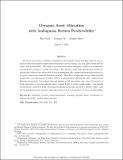Dynamic asset allocation with ambiguous return predictability
Author(s)
Ju, Nengjiu; Miao, Jianjun; Chen, Hui
DownloadChen_Dynamic asset.pdf (789.7Kb)
PUBLISHER_CC
Publisher with Creative Commons License
Creative Commons Attribution
Terms of use
Metadata
Show full item recordAbstract
We study an investor's optimal consumption and portfolio choice problem when he is confronted with two possibly misspecified submodels of stock returns: one with IID returns and the other with predictability. We adopt a generalized recursive ambiguity model to accommodate the investor's aversion to model uncertainty. The investor deals with specification doubts by slanting his beliefs about submodels of returns pessimistically, causing his investment strategy to be more conservative than the Bayesian strategy. Unlike in the Bayesian framework, the hedging demand against model uncertainty may cause the investor's stock allocation to decrease sharply given a small doubt of return predictability, even though the expected return according to the VAR model is large. Over much of the parameter space, the robust strategy is very close to the Bayesian strategy with Epstein-Zin preferences and risk aversion chosen to match the same average portfolio holdings. This is true in particular when the IID model is unlikely and the dividend yield is low, as in recent years. However, differences in strategies can be substantial if the IID model is unlikely and the dividend yield is high.
Date issued
2013-12Department
Sloan School of ManagementJournal
Review of Economic Dynamics
Publisher
Elsevier BV
Citation
Chen, Hui, et al. “Dynamic Asset Allocation with Ambiguous Return Predictability.” Review of Economic Dynamics, vol. 17, no. 4, Oct. 2014, pp. 799–823.
Version: Original manuscript
ISSN
1094-2025